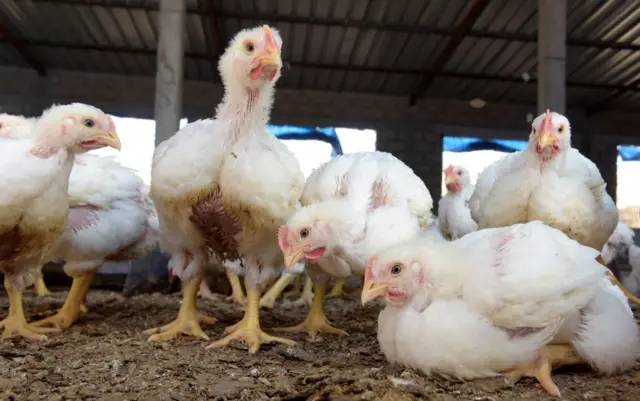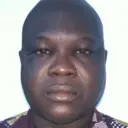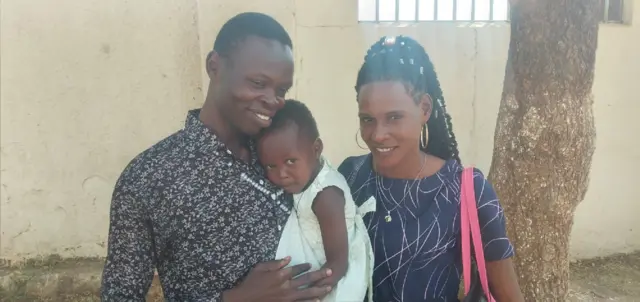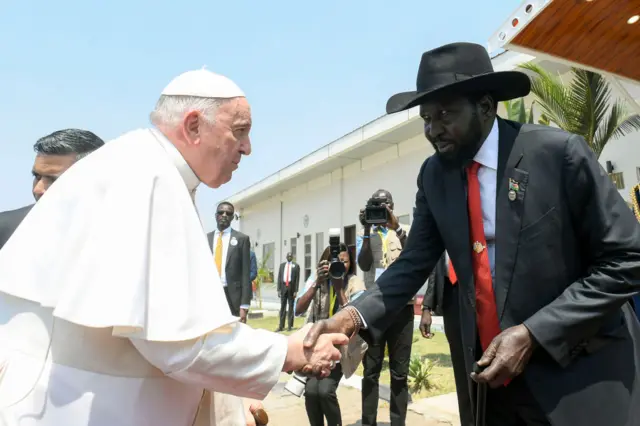South Africa slams Nigeria for football safety warningpublished at 20:56 GMT 6 February 2024
"Refrain from provocative celebrations," Nigeria tells citizens in South Africa before the Afcon semi-final.
Read More"Refrain from provocative celebrations," Nigeria tells citizens in South Africa before the Afcon semi-final.
Read MoreWith a recent Africa Cup of Nations triumph apiece, can Nigeria and hosts Ivory Coast reach the final ahead of South Africa and DR Congo?
Read MoreWith a recent Africa Cup of Nations triumph apiece, can Nigeria and hosts Ivory Coast reach the final ahead of South Africa and DR Congo?
Read MoreEgypt appoint Hossam Hassan, the country's all-time top scorer, as national team technical director after sacking Rui Vitoria.
Read MoreSenegal is seen as a bastion of democracy in West Africa, yet its polls were delayed with three weeks to go.
Read MoreThe prime minster tries to calm tensions following Ethiopia's controversial deal with Somaliland.
Read MoreDR Congo players are using their semi-final appearance at the 2023 Africa Cup of Nations to call for peace in their homeland.
Read MorePaul Mackenzie, accused of starving his followers to death, pleads not guilty.
Read MoreRishi Sunak says he took the bet with Piers Morgan to "underline" his commitment to the Rwanda policy.
Read MoreThe explosion in a densely populated neighbourhood in the capital killed six people last week.
Read MoreTheo O Ebonyi, accused of swindling his followers and others, dismisses news of his arrest as fake.
Read MoreThe west African nation has never had a coup but many are worried that recent unrest could escalate.
Read MoreRiot police fire tear gas at crowds protesting against plans to postpone presidential elections.
Read MoreLabour and SNP accuse Rishi Sunak of being out of touch, after he appears to accept bet on his Rwanda policy.
Read MoreWe'll be back on Wednesday
That's all from the BBC Africa Live team for now. We'll be back on Wednesday morning. There'll be an automated service until then.
You can listen to the latest Focus on Africa podcast here - or read the latest updates on the BBC News website.
Our proverb of the day:
Quote MessageA belt fastened while running will come undone while running."
An Amharic proverb from Ethiopia sent by Mulubrhan in Seattle, the US
Click here to send us your African proverbs.
And we leave with you with this photo of Tyla celebrating her Grammy Award win:
 Image source, Getty Images
Image source, Getty Images Image source, AFP
Image source, AFPSlaughtering, plucking and handling infected poultry puts people at risk
The capital city of Niger, Niamey, has been declared an infected zone after a fresh outbreak of the H5N1 strain of bird flu was detected in local birds.
The virus can cause life-threatening sickness in several species of birds including poultry and wild birds.
Humans in frequent contact with birds can also become infected. Symptoms can include fever, aching muscles, headache, and a cough or shortness of breath.
Key safety measure to prevent the spread of the illness are, external:
According to ActuNiger, over the past two years there have been several outbreaks of H5N1 in Niger, which is classified as a "notifiable zoonotic animal disease".
The venomous snakes and more than 100 pygmy chameleons were smuggled into the UK from Africa.
Read More Nichola Mandil
Nichola Mandil
BBC News, Juba
 Image source, Nichola Mandil/BBC
Image source, Nichola Mandil/BBCPauline Blessing Adul (c) received a blessing from the head of the Catholic Church
Pope Francis made headlines a year ago, becoming the the first pontiff to visit the newest country of the world.
But on the anniversary of that visit, during which he and church leaders from the UK called for peace, South Sudanese people feel little has change. But some are still holding out hope.
"One of the messages of the Holy Father Pope Francis to South Sudanese was to unite, but unity is still elusive in us because we feel more tribal instead of being a nation, a nation that is united," the Catholic archbishop of Juba, Cardinal Stephen Ameyu Martin, told the BBC.
He said South Sudan's resources are not being shared more widely, despite the Pope having urged "togetherness".
Baby Pauline Blessing Adul was given a blessing by the pontiff a year ago. Her parents John Bosco Okwir and Jeniffer Ayaa say she continues to be a source of "blessing and joy" to the family and community.
And according to her father, the capital city Juba feels a somewhat calmer and safer place to live than before that visit last February.
 Image source, Getty Images
Image source, Getty ImagesThe peace visit was meant to encourage President Salva Kiir (r) and deputy Riek Machar to reconcile
"They need cold beer on these beaches," one businessman tells the BBC on the Indian Ocean islands.
Read MoreJewel Kiriungi
BBC News
African leaders, mining experts and global investors are meeting in South Africa for the annual mining indaba, or conference.
Africa is home to about 30% of the world’s mineral reserves, according to the United Nations, however most of this wealth remains untapped.
“Africa has the potential to be the fulcrum of the global energy transition, with mining at its core,” said South Africa's President Cyril Ramaphosa during the opening ceremony of the four-day event in Cape Town.
Discussions will centre around the race for Africa’s critical minerals such as lithium, nickel, cobalt, manganese and graphite, which are essential for generating renewable energy - including solar panels and wind turbines.
However, South Africa is the largest greenhouse gas emitter in Africa. Most of these emissions come from coal-fired power plants which generate 80% of the electricity in the country.
The energy crisis in South Africa has made it difficult to take the coal-fired power plants off the grid.
“South Africa is pursuing a just energy transition – one that is at a pace and scale that our country can afford, and in a manner that ensures energy security and creates new opportunities for those affected,” said President Ramaphosa.
Several African countries with crucial mineral resources export them as raw ores, with limited value-addition done at source. This has caused them to miss out on the maximum value of these resources. It has also led to exploitative labour practices in mining industries across Africa.
A lack of infrastructure has also made it difficult for countries to get their minerals to markets in an efficient and cost-effective way.
The Natural Resource Governance Institute reports that the mining industry has contributed to only 8% of total government revenues in the 15 most mining-dependent African economies.
African governments will therefore be expected to demand more bargaining power during this conference and negotiate greater value for their resources.